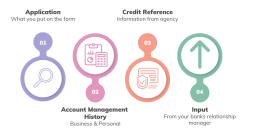The financial decisions you make could affect not only your business but any applications you may make for finance. So here is our guide to Credit Scoring Explained!
Banks review applications for finance – for them, the information contained within tells them a story about your personal and business situation, along with your financial background. Combined with a business plan and projected forecast, these are some of the factors in their decision-making process.
Your bank relationship manager will be able to support you with any applications.
Understanding you and your business

As a new business, having a good personal credit record is extremely important. This is because as a new business, there will be no prior history or credit rating. So decisions are therefore based on the individual, business owners or directors.
Banks and other lenders base their lending decision upon the credit scoring process. Using information available to them, they will calculate a score. The score does have to be at a certain level for you to be approved.
It can sometimes be frustrating moving from bank to bank, as they all have different lending criteria. One bank may accept your application, whilst another refuses.
Other financial institutions also use the credit reference information available.
Sources of information
Information on individuals’ and businesses’ credit behaviour in the UK is collected and maintained by credit reference agencies.
- Payment History
- Total amount of debt
- Time and Length of Credit
- The Type of Finance you Have
- Recent applications for Finance
The 5 points above are recorded by credit agencies on your credit profile.
Points 1 and 2 are likely to have the heaviest weighting towards your credit rating. Improving these will increase your credit rating in the long term.
What we have not addressed yet is how you can influence and improve your credit rating.
There are a number of different factors including; do you pay your bills on time? credit limit with bank? have you got credit cards? What’s your credit history and views on credit profile?
The more your business trades and creates a track-record, the better it will be for you personally because the banks will no longer need to base their decisions on you as an individual.

So what information is used to make decisions on credit scoring?


What can you do then to improve the credit score for your business?
- Pay your suppliers on time.
- Keep debt levels low (in terms of the finance / funding / loans you obtain).
- Keep old bank accounts and other credit accounts open.
- It’s good to file company accounts “Fully” – rather than “abbreviated”.
- If any information changes, such as your registered office address, update it quickly. Notify suppliers and customers of any updates, as well as organisations like Companies House.
- Ensure your personal finances are healthy, especially if you’re a start-up with little financial information available.
- Only submit credit applications when necessary. It can be tempting and sometimes essential to explore the finance options available for your business, but submitting too many in a short period of time could suggest that you’re struggling to secure funding.
I hope this information provides you with some insight into improving your credit score. It’s unfortunately not a quick fix, you’ve got to be in this for the long game.
Here at Franklin James we help our customers improve their credit score by ensuring they have cash flow available to them with our outsourced credit control services.
If you know when customers are going to pay, then you can forecast your cashflow effectively AND pay your suppliers on time.
Call or email us today to learn more about how we help many businesses across the uk save time, money and improve their cashflow.

